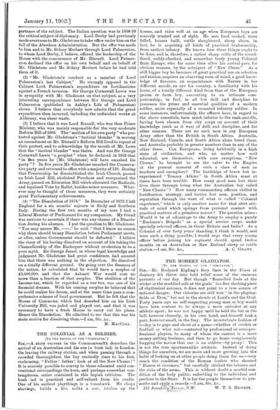THE COLONIAL AS A SOLDIER.
70 THU EDITOR OF THE "SPECTATOR: •] Sxa,—A story current in the Commonwealth describes the arrival of an Australian and his son (a bush lad) in London. On leaving the railway station, and when passing through a crowded thoroughfare, the boy excitedly rises to his feet, exclaiming, " Father ! father ! look at all the New Chums !" It is scarcely possible to convey to those educated amid con- ventional surroandinge.the keen, and perhaps somewhat con- temptuous, satire contained in this boyish criticism. The bush lad is practical and self-reliant from his cradle. One of his earliest playthings is a tomahawk. He chops shavings, builds a fire, milks a cow, • fetches up the horses, and rides well at an age when European boys are scarcely trusted (pit of sight. He sees food cooked, trees felled, houses built, cattle slaughtered, sheep shorn, in fact, he is acquiring all kinds of practical bushmanship, from earliest infancy. He knows how these things ought to be done, and is, therefore, a rather sharp critic of the round- faced, ruddy-cheeked, and somewhat beefy young. Colonist from Europe, who for some time after his arrival goes, for obvious reasons, by the sobriquet of " New Chum." As a still bigger boy he becomes of great practical use on selection and station, acquires an observing turn of mind, a good know- ledge of firearms, an acquaintance with Nature in her different moods, an eye for country, a familiarity with his horse, of a totally different kind from that of the European groom or farm boy, amounting to an intimate com- panionship ; in fact, in all but drill and discipline he possesses the prime and essential qualities of a modern soldier, more especially of a mounted infantry soldier. In some instances, unfortunately, the officers have, in regard to the above essentials, been much inferior to the rank-and-file, having been chosen from city corps on account of their knowledge (such as it was) of drill and discipline, and for other reasons. There are no such men in any European Army other than the British in South Africa. Australia, New Zealand, Canada, and South Africa alone breed them; and Australia probably in greater numbers than in any of the other three. Can Europeans, living habitually in a high state of civilisation, and who, no matter how well educated, are themselves, with rare exceptions, " New Chums," be brought to see the value to the. Empire at the present moment of such a class of men as teachers and exemplars ? The hardships of brave but in- experienced " Tommy Atkins " in South Africa must at times have been terrible. How many good men lost their lives there through being. what the Australian boy called New Chums " ? How many commanding officers skilled in fortification, strategy, and tactics lost men, position, and reputation through the want of what is called " Colonial experience," which is only another name for that alert atti- tude of mind which springs from personal contact with practical matters of a primitive nature ? The question arises : Would it be of advantage to the Army to employ a purely " Bushmen's Brigade " as a special service corps, under specially selected officers, in Great Britain and India ? As a Colonist of over forty years' standing, I think it would, and were such a thing possible, I would urge that every young officer before joining his regiment should spend twelve months on an Australian or New Zealand sheep or cattle






































 Previous page
Previous page